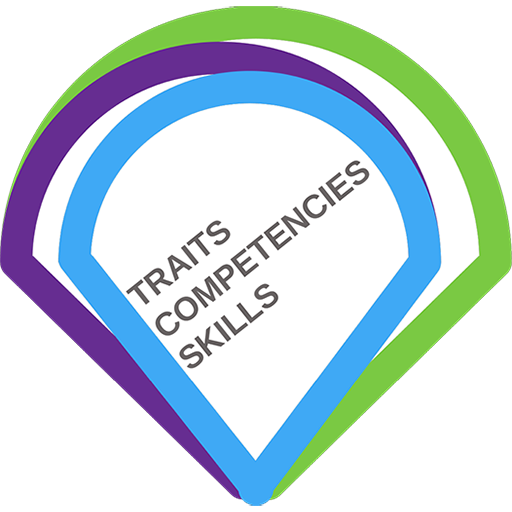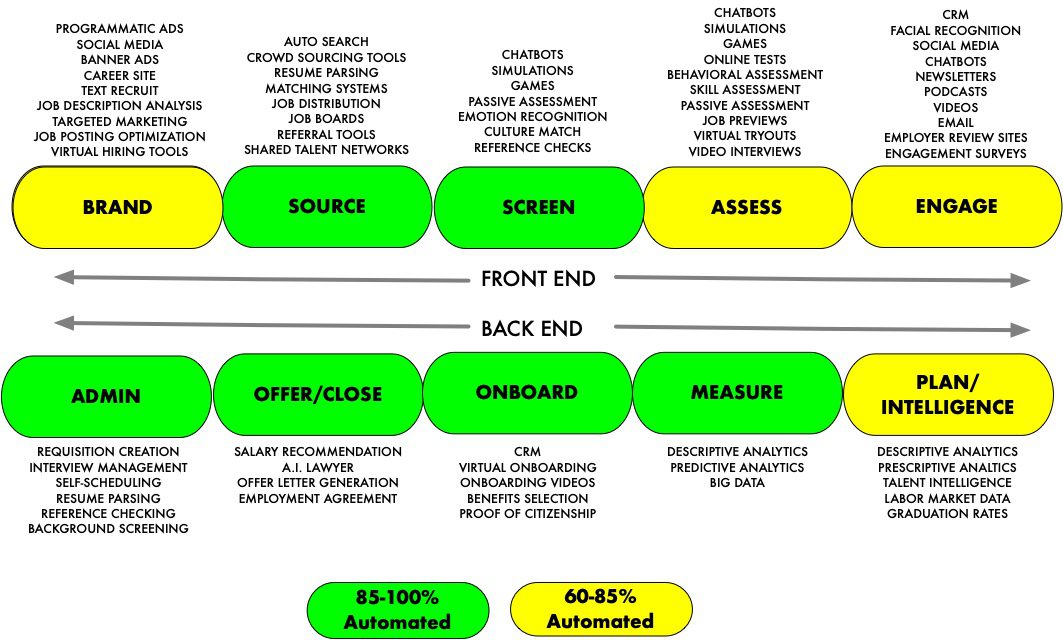
The Challenge: AI is Reshaping Talent Acquisition
Understanding the traits, competencies, and skills of your internal TA team has never been more critical. Talent Acquisition is experiencing unprecedented change as AI continues to reduce traditional recruitment volumes and automation transforms core TA processes; what I call the “AI Talent Acquisition Squeeze.”
Some TA functions proactively address this challenge by evolving into Talent Advisors, while others feel stuck, uncertain about the best path forward. The difference between thriving and struggling comes down to two fundamental actions:
- Understanding your current internal Talent Acquisition bench strength
- Developing it strategically to add maximum value to the business
The diagram above, prepared by Kevin Wheeler, shows the potential impact of AI on the current recruitment process.
Why Visibility Drives Improvement
The principle “if you can measure it, you can improve it” is particularly relevant here. Once you understand your team’s traits, competencies, and skills in relation to Talent Advisory, you can:
- Develop areas requiring improvement
- Leverage strong TA team members to support others
- Optimally match team members to business priorities, deploying your most skilled advisors in the highest-value areas while developing the remaining team members.
This strategic approach transforms TA from a transactional function to a valued business partner with a growth mindset.
What Does a Talent Advisor Do?
To understand your team’s development needs, it’s essential to grasp the key actions Talent Advisors perform:
Strategic Market Intelligence
- Analyse external talent supply/demand dynamics for business-critical roles
- Benchmark organisational value proposition against market competitors
- Map internal talent capabilities against current and future business needs
- Understand technology’s impact on evolving skill requirements
Technology & Innovation
- Leverage AI/ML tools for predictive talent analytics and market forecasting
- Implement talent intelligence platforms for real-time market insights
- Deploy automation for candidate sourcing, screening, and engagement
Strategic Talent Decision Framework
- Advise on optimal talent strategies: Buy, Build, Borrow, or Bot
- Guide make vs. buy decisions with ROI analysis and risk assessment
- Design a cohesive workforce planning aligned with the business strategy
Execution & Delivery
- Execute targeted recruitment for critical positions
- Create partnerships for talent borrowing arrangements
- Build talent pipelines and networks for hard-to-fill roles
- Develop detailed market maps for key talent segments
Financial & Performance Analytics
- Calculate the total cost of ownership for different talent acquisition approaches.
- Quantify the opportunity costs of unfilled positions.
- Develop budget forecasts for talent development, branding, and remuneration.
- Provide ROI metrics for talent acquisition investments
The Ten Critical Characteristics of Successful Talent Advisors
Understanding the key characteristics of a Talent Advisor and then thinking about your team is an interesting exercise. Outlined below are the typical characteristics that TCS Insights benchmarks for Talent Advisory
Creativity – The capacity to think outside the box when partnering with business leaders, colleagues, and HR/People teams to design innovative talent solutions and unconventional sourcing strategies
Collaboration – Working effectively with hiring managers, HR partners, and external stakeholders to align talent strategies with business objectives and deliver optimal hiring outcomes
Insightfulness – Deep understanding of talent market dynamics, candidate motivations, and what roles may be augmented or transformed, enabling informed recommendations on complex talent challenges
Analytics – The ability to interpret talent data, identify hiring patterns, and uncover root causes of recruitment challenges to drive evidence-based talent decisions
Customer Orientation – Understanding and balancing the needs of all internal and external stakeholders, with particular focus on hiring managers as key customers, whilst ensuring organisational alignment
Influencing – Shaping stakeholder perspectives on talent strategies, candidate assessments, and market realities through compelling insights and trusted advisory relationships
Leadership & Mentoring – Guiding talent acquisition teams, mentoring junior recruiters, and coaching hiring managers on best practices whilst fostering collaborative hiring approaches
Curiosity – Continuously seeking market intelligence, emerging talent trends, and innovative practices to enhance talent acquisition effectiveness and candidate experience
Strategic Thinking – Leveraging market trends and organisational changes to develop forward-thinking talent strategies that address current gaps and anticipate future needs
Market Intelligence – Deep expertise in talent market conditions, evolving skill demands, AI impact on roles, and competitor positioning to optimally position the organisation’s employer brand
Talent Advisor Configuration Models
Once you’ve assessed your team’s capabilities, you’ll need to determine the optimal configuration for your organisation. Here are five proven models:
Model 1: Universal Transformation
All TA members become Talent Advisors
- Best for: Smaller TA teams (5-15 people) with strong foundational skills
- Benefits: Complete strategic alignment, simplified structure, enhanced team capability
- Considerations: Requires significant investment in upskilling and may take 12 months to implement fully
Model 2: Strategic Partnership Model
Select Talent Advisors embedded with key business units
- Best for: Large organisations with distinct business divisions
- Benefits: Deep business partnership, specialised market knowledge, focused expertise
- Considerations: Maintain connection to central TA team, avoid silos
Model 3: Hub and Spoke Model
Multiple Talent Advisors mentoring team whilst engaging the business
- Best for: Medium to large TA teams (15-50+ people) with mixed skill levels
- Benefits: Accelerated team development, knowledge sharing, scalable expertise
- Considerations: Clear mentoring frameworks and regular knowledge transfer sessions are essential
Model 4: Centre of Excellence Model
Dedicated Talent Advisory team supporting traditional TA functions
- Best for: Very large organisations with complex talent challenges
- Benefits: Specialised expertise, consistent methodology, scalable insights
- Considerations: Avoid creating a disconnect between advisory and execution teams
Model 5: Hybrid Matrix Model
Combination of embedded advisors and central team
- Best for: Complex, multi-divisional organisations with varying maturity levels
- Benefits: Flexibility, customised approach, maintains both specialisation and coordination
- Considerations: Requires strong governance and clear role definitions
Choosing Your Configuration
Consider these factors when selecting your model:
- Organisation size and complexity
- Current team skill levels and development appetite
- Business stakeholder preferences and maturity
- Available budget and timeline
- Existing TA team structure and culture
What’s Next?
The critical question is: where does your current Talent Acquisition team stand in relation to the ten characteristics outlined above?
TCS has developed a comprehensive assessment to evaluate, benchmark, and build your team across these critical capabilities. This tool provides actionable insights to guide your transformation journey.
Success won’t be determined solely by technical skills; it’s your team’s ability to partner strategically, leverage data effectively, and work collaboratively with all stakeholders to create genuine business value that will define the future of your TA function.
The organisations that proactively assess, benchmark, and develop their teams on these capabilities will emerge stronger from the AI Talent Acquisition Squeeze, while those waiting may find themselves squeezed out entirely.
© 2023 tcsinsights.com | Privacy Policy | Terms of Service



Recent Comments